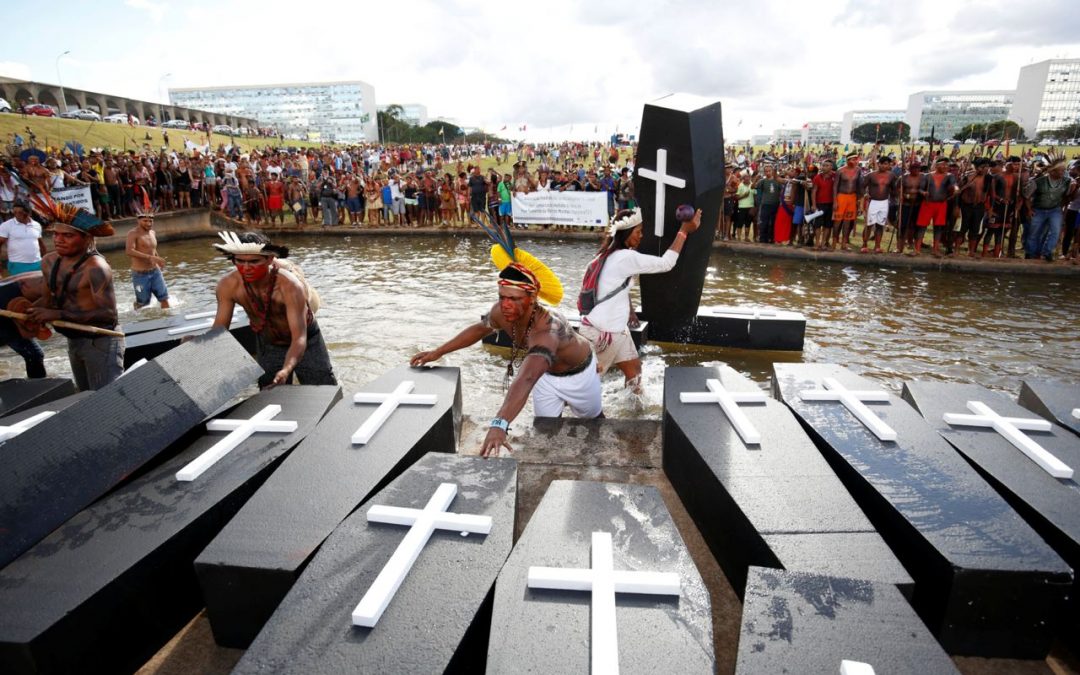
09/Aug/2021
Photo: Ueslei Marcelino/Reuters
For the first time in history, Indigenous Peoples address directly the court in The Hague, with their own lawyers, to stand up for their rights.
Brasília, August 9, 2021 – The Articulation of Indigenous Peoples from Brazil (Apib) filed, this Monday (9), a statement before the International Criminal Court (ICC) to denounce Bolsonaro’s government on Genocide. On the date that marks the International Day of Indigenous Peoples, the organization requests the Court’s prosecutor to examine the crimes perpetrated against indigenous peoples by President Jair Bolsonaro since the beginning of his term, in January 2019, with special attention over the period of Covid-19 pandemic.
Based on ICC’s precedents, Apib demands an investigation for crimes against humanity (article 7. b, h. k Rome Statute – extermination, persecution and other inhuman acts) and genocide (art. 6. B and c of the Statute of Rome – causing severe physical and mental damage and deliberately inflicting conditions aimed at the destruction of indigenous peoples). For the first time in history, indigenous peoples stand before the ICC, with the support of indigenous lawyers, to defend themselves against these crimes.
The statement is composed by several complaints from indigenous leaders and organizations, official documents, academic research and technical notes, arriving to prove the planning and execution of an explicit, systematic and intentional anti-indigenous policy headed by Bolsonaro.
“We believe there are acts in progress in Brazil that constitute crimes against humanity, genocide and ecocide. Given the inability of the justice system in Brazil to investigate, prosecute and judge these conducts, we denounce them to the international community, throughout the International Criminal Court”, highlights Eloy Terena, legal coordinator of Apib.
According to an excerpt of the communication, “the dismantling of public structures for social and environmental protection, and also of those addressed to protecting Indigenous Peoples resulted in the escalation of invasions in Indigenous Lands, deforestation and fires in Brazilian biomes, and also increased illegal mining in the territories.”
For APIB, attacks against Indigenous Peoples and their territories were encouraged by Bolsonaro several occasions along his term. The facts that evidence the Federal Government’s anti-indigenous project range from the explicit refusal to demarcate new lands, including bills, decrees and ordinances that try to legalize invasive activities, stimulating conflicts.
“Apib will continue to stand up for the right of Indigenous Peoples to exist in their diversity. We are native peoples and we will not surrender to extermination”, emphasizes Eloy, one of the eight indigenous lawyers who signed the statement.
The complaint statement sent to the ICC, was supported by the Collective of Advocacy on Human Rights – CADHu and the Comissão Arns, which filed, in 2019, another statement to the ICC Prosecutor’s Office against Bolsonaro, currently under review in the court.
Indigenous August
“We have been fighting every day for hundreds of years to ensure our existence and today our fight for rights is global. The solutions for this sick world come from indigenous peoples and we will never remain silent in the face of the violence we are suffering. We sent this communiqué to the International Criminal Court because we cannot fail to denounce Bolsonaro’s anti-indigenous policy. He needs to pay for all the violence and destruction he is leading”, says Apib’s executive coordinator, Sonia Guajajara.
According to the coordinator, the month of August will be marked by mobilizations from indigenous peoples fighting for their rights. She highlights the ‘Struggle for Life’ camp, scheduled to take place between August 22nd and 28th, in Brasília. “We will occupy the federal capital once again to prevent setbacks against the rights of our peoples”, reinforces Sonia.
“We alert the International Criminal Court to the authoritarian escalation underway in
Brazil. The democratic environment is under risk”, says Dinamam Tuxá, executive coordinator for Apib, recalling the bills that are under Brazilian National Congress analyse and represent serious threats for indigenous rights, and also the judgment by the Supreme Court (STF) on the Temporal Mark, that can define the future of indigenous peoples.
“We are calling to action in Brasília, in the midst of a pandemic, because today the Federal Government’s anti-indigenous agenda represents a more lethal threat than the Covid-19 virus. The lives of Indigenous Peoples are linked to their territories and our lives are under threat. We will be mobilized in the communities, in the cities, in Brasília and in the court in The Hague to hold Bolsonaro accountable and fight for our rights”, highlights Tuxá.
“Indigenous Peoples will remain vigilant, as they have historically done. It is the duty of the Brazilian federal government to respect them, as a foundational expression of a Constitutional State of Law”, points out an excerpt of the document sent to the ICC.
HIGHLIGHTS
- On November 19, 2019, the Collective of Advocacy on Human Rights – CADHu and the Arns Commission presented a statement for inciting genocide and crimes against humanity perpetrated by Jair Bolsonaro against indigenous peoples.
- During the second half of 2020, Apib and the Clinic of Strategic Litigation in Human Rights of Fundação Getúlio Vargas, São Paulo, held workshops with indigenous lawyers, leaders, students, experts and Apib partners on the jurisdiction of the ICC.
- Soon after, the APIB launched a call for leaders and grassroots organizations to send complaints of rights violations, especially in the context of the pandemic. Such reports were largely incorporated in the statement to the ICC.
- The meetings addressed issues such as international criminal jurisdiction and its criticisms, crimes under the Rome Statute, the process before the ICC, the role of victims in the construction of cases, admissibility and the agenda of the Prosecutor’s Office.
- On December 2020, the ICC Attorney’s Office informed the Collective of Advocacy on Human Rights – CADHu and the Arns Commission that the communication sent in November 2019 was under formal evaluation.
- During the first half of 2021, based on the workshops held in 2020, APIB began collecting testimonies and relevant data on the impact of Jair Bolsonaro’s actions on different indigenous communities in the country.
- The reports issued directly by the affected indigenous peoples, official documents, academic research and technical notes integrate the evidence to support the statement presented by Apib today, August 9th, before the ICC, in association with the Collective of Advocacy on Human Rights – CADHu and Comissão Arns.
- The document has 86 pages describing concrete facts, which are organized into:
- A chronology of Bolsonaro’s attacks against indigenous peoples, what includes the destruction of public infrastructure to guarantee indigenous and socio-environmental rights, through administrative acts, normatives, speeches, meetings and projects, directly or indirectly carried out by President Jair, were compiled Bolsonaro;
- The description of the main consequences of the destruction of public infrastructure to guarantee indigenous and socio-environmental rights: the invasion and dispossession of indigenous lands; the deforestation; mining into the territories and the impact of the Covid-19 pandemic on indigenous peoples, bringing research, reports and data.
- The report on the impact of invasions, deforestation, mining into Indigenous Lands and the spread of the Covid-19 pandemic over isolated indigenous peoples or those with recent contact and over the Munduruku peoples, the indigenous peoples who live in the Yanomami TI, the Guarani-Mbya, Kaingang, the Guarani-Kaiowá, the Tikuna, Kokama, the Guajajara and the Terena.
- APIB brings to the international criminal jurisdiction the voice and interpretation of indigenous peoples on the crimes of which they have been victims, a fact that is historical by itself.
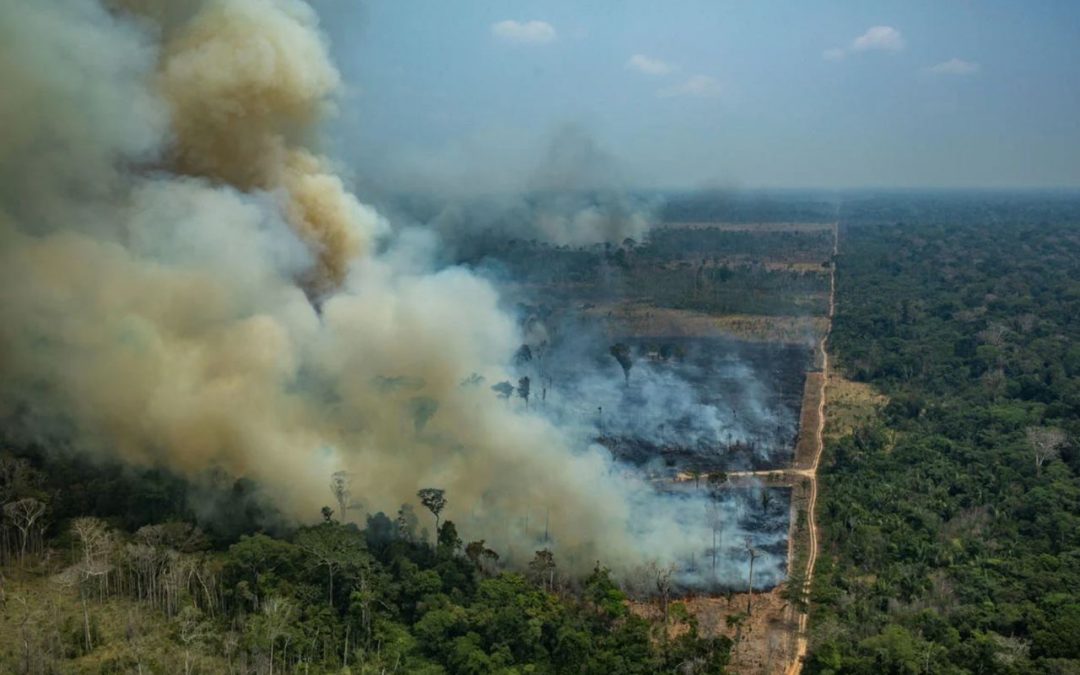
04/Aug/2021
Early last night (August 3rd), Brazilian congressmen showed the interests they stand for, approving the Bill 2633 known as “PL da Grilagem” (Land Grabbing Bill) with a large majority (296 x 136 votes). The approved text was not previously presented to civil society, a typical behavior of anti-democratic regimes.
They argue that the bill is a necessary instrument to register land for small farmers. However, Brazil already has a land reform framework and land allocation policies that only need to be effectively implemented. The approved text, which is now following for the appreciation by the Federal Senate, legalizes the illegal: it regularizes criminally appropriated lands, in processes that often include violent acts against indigenous peoples and traditional communities.
Grilagem means land grabbing. For those unfamiliar with the expression, it is the name given to the invasion, occupation and illegal trade of public areas. This crime has now been converted into law. The practice is directly linked to deforestation, to the destruction of biodiversity and threatens indigenous peoples who traditionally occupy territories, now usurped by land grabbers.
According to the Amazon Environmental Research Institute (Ipam), around 30% of deforestation and burning in the Amazon occurred on public lands without designation, which were possibly targeted by land grabbers. Still, studies by Imazon estimate that if PL 2633 effectively becomes a law, it will cause an additional deforestation of up to 16 thousand square kilometers, an area almost 3 times the size of the Brazilian Federal District.
Theft of public land is nothing new in Brazil. What is unprecedented is that the State, which should look after the common good, shamelessly decides to reward thieves and usurpers with the regularization of stolen lands. This ethical and legal aberration puts our forests, our biodiversity and the peoples who depend on them – especially indigenous peoples, traditional communities and family farmers – on their knees in the face of the typical violence processes of invasion and illegal appropriation of land.
While the whole world discusses ways to keep forests standing as a solution to climate change, the Brazilian government continues to “passar a boiada” (pass the cattle), opening the way for an increase in deforestation rates, which goes against its own commitments to zero illegal deforestation.
Indigenous peoples express their consternation over this absurd and irresponsible sign emanating from the self-proclaimed “People’s House”. By approving this project, the Chamber demonstrates that it is gradually and unavoidably becoming the home of ruralists, agribusiness, deforesters, land grabbers – all of them, except for the people.
The Brazilian indigenous movement continues in the struggle for its constitutional rights.
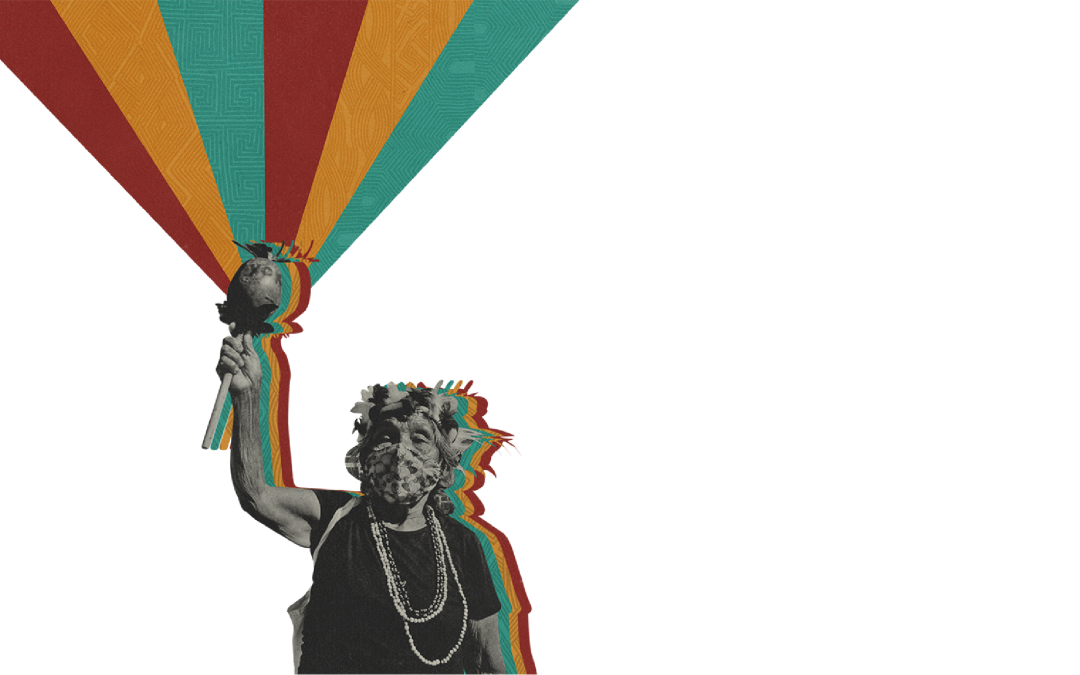
19/Jul/2021
For the last 521 years this land has been characterized by violations, racism and genocide. Centuries of attempts to subjugating peoples, cultures and territories. Today there are not only guns tearing at bodies, but also pens signing extermination laws. When not only criminals are directly attacking, governments skip away from their duty of protecting our peoples. And as much as the fights overlap, we won’t allow it!
We are the first ones in this land, before even Brazil becomes Brazil.
Against bills that violate the Constitution itself, we will continue to be mobilized in the federal capital, sounding our maracas and singing our songs, between the 22nd and 28th of August.
We make this call, even during the pandemic, because we cannot remain silent facing genocide and echocide, because the Earth screams even when we are quiet. May the country listen to its native peoples. Our lives are linked to the earth, as we live in communion with it. We are the guardians of the forests and all forms of life that there inhabit. Facing a Congress that advances in an anti-indigenous agenda and against the Temporal Framework, scheduled to be voted by the Supreme Court on August 25th, we will resist!
We will lead vaccinated to Brasília, with all the hygiene precautions against Covid-19, to play our maracas to guarantee the rights of indigenous peoples.
Come together, relatives, to STRUGGLE FOR LIFE Camp.
Support
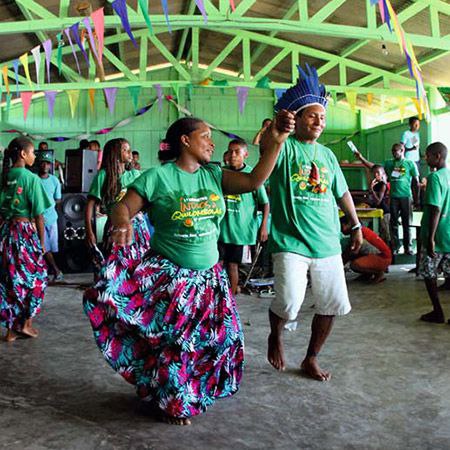
16/Jul/2021
The framework for the protection of traditional peoples has been disregarded by the country. Late submission of government responses to inquiries from the international organization and organizations prevents the manifestation of the Committee of Experts
Brazil has systematically violated Convention 169 of the International Labor Organization (ILO), as social organizations denounced in a recent report. The report presented before ILO by the National Coordination of Rural Black Quilombola Communities (Conaq), and by the Coordination of Indigenous Peoples of Brazil (Apib), with the support from the Land of Rights and Central Única dos Trabalhadores (CUT), list a set of actions perpetrated by the Brazilian State that violate the main international legal instrument on the protection of the rights of indigenous peoples, quilombolas and other traditional peoples and communities.
The report emphasizes that the State’s failure to protect indigenous peoples, quilombolas and other traditional peoples in the face of Covid-19 particularly violates the rights of these traditional peoples, exposing them to a context of even worse vulnerability under the pandemic and its effects.
Similar complaints are part of actions filed by Apib and Conaq, in association with other institutions, before the Brazilian Supreme Court (STF). In judgments of both actions, the Ministers recognized the government’s omission and determined that the Brazilian State had to develop and implement urgent plans to fight the pandemic addressed to indigenous peoples and the quilombola population, as well as the inclusion of these groups as priorities for vaccination in the National Immunization Program. Several months after the decisions by the STF, Conaq, Apib and other organizations have repeatedly denounced the weaknesses in the implementation of these measures.
Fundamental in guaranteeing the rights of traditional peoples, quilombolas and indigenous peoples in Brazil, Convention 169 has guided parameters for several Brazilian norms and public policies since the ratification of the norm by the country, in 2002. Even after more than 15 years of validity in national territory, before the pandemic, Brazil was already violating the Convention, point out the organizations. The urgency of the denunciation at this moment, however, underline the organizations, is that the violations have been intensified in the last three years and the rights already assured have suffered significant retractions, especially during the Bolsonaro government.
As the legal advisor of Terra Direitos, Maira Moreira, highlights, “one of the most fundamental instruments for asserting the rights of indigenous peoples, quilombolas and other traditional peoples and communities is being successively and repeatedly violated by the Brazilian State, producing a situation of genocide of these peoples and communities, a slow and gradual genocide, in which all their material, cultural and social conditions are undermined, putting the existence of these peoples and communities under risk”. Since “[the Convention] was already being violated, but in the context of the pandemic, this violation was aggravated”, reiterates Apib’s lawyer, Eloy Terena.
No centimeter
The period of the recorded violations against the 169 Convention by the Brazilian State coincides with Jair Bolsonaro’s term as president. . Openly opposed to the rights of traditional peoples and communities, the president has already stated that in his government “there will not be a centimeter demarcated for an indigenous or for a quilombola land”.
It is not only the presidential declarations that go shoulder to shoulder with the denial and violation of the rights of these populations, but also the dismantling of the indigenous and quilombola policies established by the national government.
In the list of attacks against traditional territories, they are still the incursions by land grabbers, miners and ruralists. In 2020, among the 81,225 families who were victims of invasions in their territories, 58,327 were indigenous, according to a survey released by the Pastoral Land Commission (CPT). “The territories were completely at the mercy of these invaders. Their presence alone is a violation of the exclusive use of indigenous peoples over their territories, but in this pandemic, illegal incursions become a vector for the spread of the disease”, emphasizes Eloy.
The document sent by the organizations to the ILO also highlights the violation of the right to self-determination by the people, attacks on policies for these people, such as the extinction of the Secretariat for Continuing Education, Literacy, Diversity and Inclusion (Secadi), among other violations.
Legislative threats
The most expressive caucus in Congress, congressmen linked to the Parliamentary Front for Agriculture – a lobby supported by agribusiness associations and companies – account for 32 of the 81 seats in the Senate. In the Chamber, the 225 deputies affiliated to the front will represent 44% of the total votes (513) of the entire legislative house.
With this majority representation and no correspondence with the composition of the Brazilian population, the ruralists impose an agenda that enables the market to enter the territories. A singular example is PL 490/2007. The bill threatens the demarcation of indigenous lands, opens the doors of these territories to agricultural projects, hydroelectric plants, mining, roads and mining. In a scenario of intense police violence against indigenous people around the Chamber of Deputies and lack of dialogue with those who will be impacted by the measure, the PL was approved by the Chamber’s Constitution and Justice Commission (CCJ) on June 23rd.
The Draft Legislative Decree (PDL) No. 177/2021, on the other hand, seeks to directly violate Convention 169. Authored by federal deputy and member of the FPA, Alceu Moreira (MDB-RS), the bill filed in April this year aims to authorize the president to denounce ILO Convention 169, that is, if approved, the Legislative Decree would allow Bolsonaro to withdraw Brazil from the Convention, a procedure called “denouncement”, representing a huge setback to conquered rights. The legislative matter has already been distributed to the House commissions.
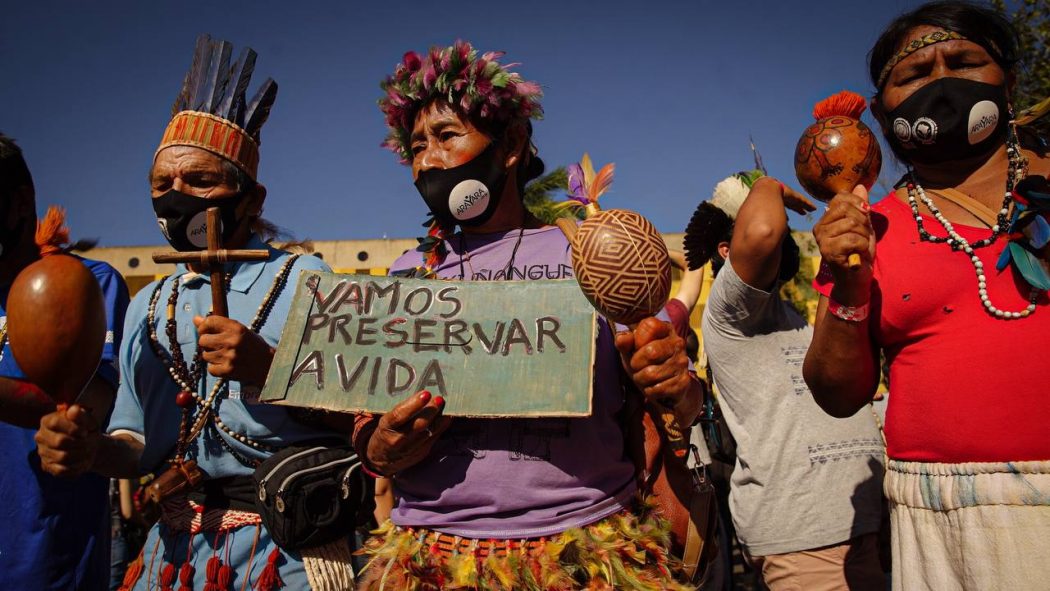
16/Jul/2021
The appeal was made in the same week Brazil was mentioned due risk of atrocity against indigenous peoples; Brazilian government tried to present a counter-argument, denied by the UN organism
By Adi Spezia and Tiago Miotto, Cimi’s Communication Department
In a joint statement during the 14th Session of the UN Mechanism of Experts on the Rights of Indigenous Peoples (EMRIP), the Articulation of Indigenous People from Brazil (Apib) and the Indigenous Missionary Council (Cimi) denounced this Wednesday (14) measures adopted by the Brazilian government and by the National Congress that attack the rights of indigenous peoples in Brazil, such as 490 Bill, which in practice makes unfeasible new demarcations of indigenous lands, and the thesis of the temporal framework.
The meeting, which aims to listen to indigenous peoples and their organizations, was held virtually in this edition, due to the pandemic. It had as its central issue the self-determination of peoples and the rights of indigenous children. The EMRIP is a unique mechanism whose members are exclusively indigenous peoples. “It is a very important mechanism for the world’s indigenous community, led by indigenous peoples,” explains Paulo Lugon Arantes, Cimi’s international advisor.
Arantes, speaking on behalf of both organizations, highlighted the seriousness of the temporal frame and of the more than 30 other bills pending in the Brazilian Congress that violate the right of free determination from native peoples. The 490 Bill, recently approved by the Commission for the Constitution and Justice (CCJ) from the Chamber of Deputies, was highlighted as one of the main threats to indigenous rights today.
“The time frame is disastrous because it will leave an incalculable mark of exclusion and marginalization over peoples who have not yet had their territories demarcated or who have been expelled from their traditional territories”, said Paulo.
The organizations also denounced the Brazilian government’s anti-indigenous agenda, which led the UN Special Advisor for the Prevention of Genocide, Wairimu Nderitu, to express an unprecedented concern with the situation of indigenous peoples in Brazil.
“President Bolsonaro has a clearly anti-indigenous agenda, which led the UN advisor for the prevention of genocide to include Brazil in the World Atrocity Map”, said the advisor, on behalf of Apib and Cimi.
Reply denied
After the joint statement, the representative from Brazilian government asked for “the right to reply”, due to the fact that the country was mentioned. The response was denied by the EMRIP secretariat, who replied that Governments have no right to respond before the mechanism. “The members of the EMRIP are the only members of the mechanism and all others are observers,” explained the secretary.
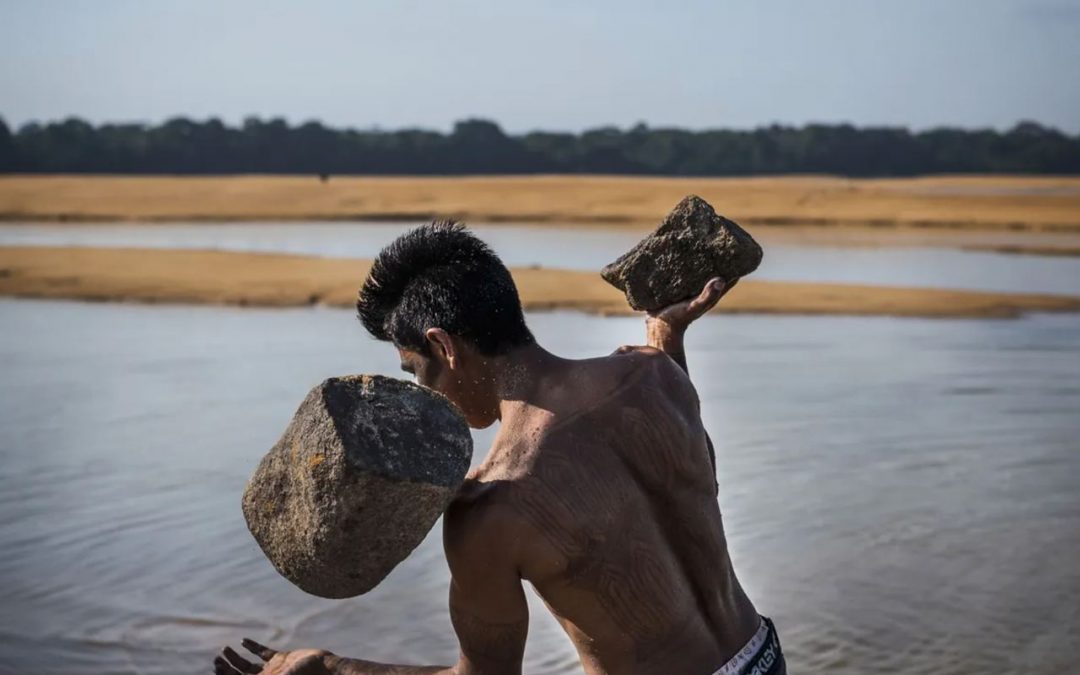
13/Jul/2021
The campaign demanding Anglo American, one of the world’s biggest mining companies, end its plans to exploit indigenous territories, followed the October 2020 Complicity in Destruction III report. The company still has 86 active mining interests in the Brazilian National Mining Agency (ANM) database that impact indigenous territories.
Photo: Aaron Ekraim
Pará, Brazil | July 13, 2021 – British mining company Anglo American has formally committed to withdraw 27 approved applications to research minerals inside indigenous territories located in the states of Mato Grosso and Pará from the Brazilian National Mining Agency (ANM). The commitment was informed on May 24, after pressure from the Munduruku people, the Association of Brazil’s Indigenous Peoples of Brazil (APIB), the Coordinating Body of Indigenous Organizations of the Brazilian Amazon (COIAB), and Amazon Watch.
Of the total applications filed by Anglo American, one of the largest mining companies in the world, and approved by the ANM, 13 directly impacted the Sawré Muybu Indigenous Land, which belongs to the Munduruku people, in southwest Pará.
According to Anglo American, ANM was informed of the withdrawal, and the company was waiting for the agency’s database to be updated. In its email response to APIB, the company states that, based on concerns raised by the organizations and the opposition of Indigenous groups against mining activities on their territories, it reconsidered these licenses and made the decision to withdraw all 27 of them.
“It is a victory, but we want to know if Anglo American will actually keep its word or if it will return to our territory by other means, as the government does by creating new regulations to get inside Indigenous territories. We are resisting and will continue to do so. We have been suffering countless threats — from a bill in Congress to loggers, miners, palm tree farmers, and land grabbers inside our own territory. So we don’t trust them; we will only do so if in two or three years’ time we can live in peace. Anglo American must keep its word because we don’t believe everything even if put on paper. The Constitution exists to be respected, but it is being violated and ripped to shreds,” says Alessandra Munduruku, deputy coordinator of the Federation of Indigenous Peoples of Pará (FEPIPA).
The campaign for Anglo American to withdraw from all mining research applications that overlap with Indigenous territories started after APIB and Amazon Watch released Complicity in Destruction III: How Global Corporations Enable Violations of Indigenous Peoples’ Rights in the Brazilian Amazon in October 2020, which revealed that the mining company had almost 300 registered research applications overlapping 18 Indigenous Territories in the Amazon, some inhabited by Indigenous peoples living in voluntary isolation. The British mining company’s most recent target had been the Sawré Muybu, in the Middle Tapajós, home to the Munduruku people. Five applications were filed from 2017 to 2019.
Confronted with the data several times after the release of the report and by the campaign, Anglo American repeatedly took a stand and claimed it had given up all requests for mineral exploration in areas located on Indigenous lands in Brazil. However, a July 2021 survey conducted by InfoAmazonia’s Mined Amazon project shows that Anglo American still has 86 active mining interests in the ANM database that impact Indigenous territories.
“The decision by Anglo American is important, and a direct result of Indigenous peoples’ resistance to mining in our territories. But this decision is not enough. We cannot ignore that the mining company still has dozens of requests for mineral exploration that affect other Indigenous territories. This is why we will remain strong with our initial call to Anglo American: to publicly commit not to mine on any Indigenous land in Brazil. The majority of the Indigenous peoples and communities in Brazil do not share the desires of a minority of Indigenous individuals who are deluded and yield to the covertly evil intentions of this administration,” said Eloy Terena, APIB’s legal coordinator and COIAB’s legal advisor.
Over the past two years, under far-right president Jair Bolsonaro, Brazil has set a new record of mining applications within Indigenous lands. According to a 2020 survey carried out by Amazônia Minada, a total of 143 mining applications that overlap Indigenous lands were filed, and not rejected, at the ANM — the highest amount in the last 24 years, and nearly three times as much as those filed in 2018, the year after which Bolsonaro took office. A slew of applications followed after Bolsonaro introduced Bill 191 in February 2020, which provides for the regularization of mineral exploration on Indigenous lands, thus fulfilling one of his most controversial campaign promises. Even more worrying, 71 of the 143 applications filed in 2020 overlapped lands where the Brazilian National Indigenous Foundation (FUNAI) has records of isolated Indigenous peoples.
In the Yanomami IT alone, the Brazilian Indigenous land with the largest area formally requested for mining, around 3.3 million hectares (34.3% of the IT’s total area) are slated for mineral extraction across 500 applications filed at the ANM — an area larger than Belgium (3 million hectares) or the state of Alagoas (2.7 million hectares) is being disputed with miners. Almost a third of these applications concern gold mining. Over the past two months, Yanomami communities have been subjected to sustained attacks by illegal miners.
“The companies that continue to file these requests, even though they are aware of the conflicts mining has created inside Indigenous territories, are contributing to the ruinous project carried out by the Bolsonaro administration. With the threat of Bill 191/2020 drawing nearer, we will continue our campaign against mining giants, such as Anglo American, to show their commitment or lack of indigenous rights and take a stand against this bill,” says Rosana Miranda, Amazon Watch’s campaign consultant.
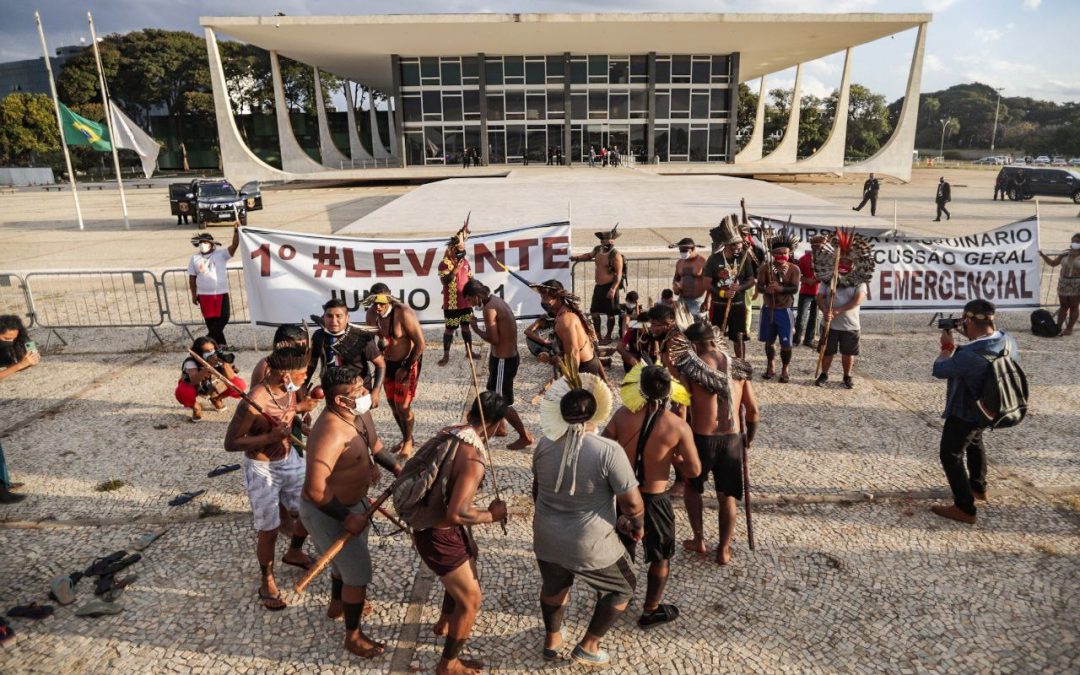
07/Jul/2021
This bill could cancel the indigenous lands demarcation and represent a new genocide to the originating peoples.
The Articulation of Indigenous People From Brazil (Apib) forwarded, this Tuesday (6), to the United Nations (UN) an “urgent appeal” for taking action to stop the processing of the law project 490 bill in the National Congress. The appeal was made together with the Coordination of the Brazilian Amazon ‘s Indigenous Organization (Coiab), Arns Commission, Social-Environmental Institute and Human Rights Conectas
The bill’s text was approved, last week, in the Commission of Constitution and the Justice of Brazilian’s Congress and, according to the entities, cancels the indigenous lands demarcation, threatens the existing territories and takes constitutional rights away.
“We present the information in this urgent appeal to the special procedures of the United Nations and the Special Rapporteur of the CIDH to request the investigation and demand immediate measures by the Brazilian authorities about the legally iresponsable procedures, in particular the Substitute Bill nº 490/2007, in the Brazilian’s Congress, which will violate the indigenous rights in the country, invalidating indigenous lands demarcations, threatening the certified territories and destroying, constitutional rights, and are also incompatible with the international obligations assumed by Brazil in human rights.” highlighted exert of the appeal sent.”
Access the complete file here: Urgent Appeal_Brazil Draft Bill 490
Besides the 490 bill, the document sent to the UN requires all projects of law with similar consequences to be subjected to a wide and detailed democratic debate.
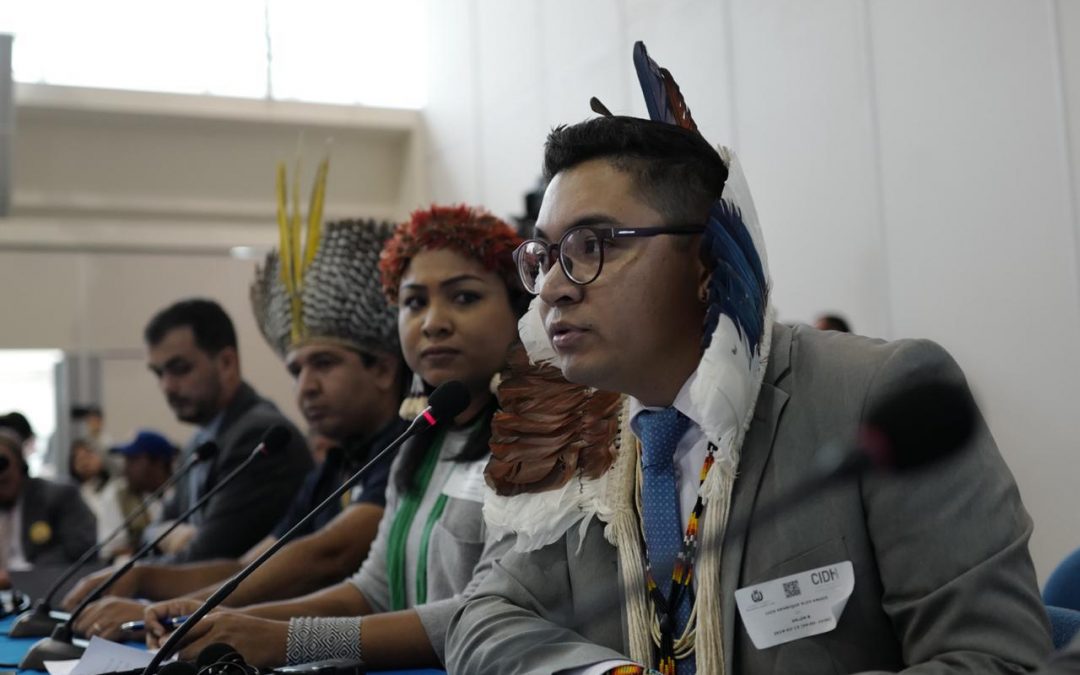
01/Jul/2021
The violence escalation into indigenous territories during Covid-19 pandemic will be on the center of the complaints.
This Thursday, July 1st, the Inter-American Commission on Human Rights (IACHR) receives complaints from indigenous organizations and leaders representing the Munduruku, Yanomami and Guajajara peoples, about the worsening of violence in their territories during the period of Covid-19 pandemic. The action is part of the 180th Session of the Commission and meets the request of the Articulation of Indigenous Peoples of Brazil (Apib) in conjunction with the Coordination of Indigenous Peoples of the Brazilian Amazon (COIAB), Association of Munduruku Wakoborũn Women and Hutukara Association, in addition to other partners.
“The escalation of violence foreshadows even more tragic results, and that is why it is essential this Commission takes all appropriate measures.”, highlights an excerpt from the communiqué sent to the IACHR to request the hearing that takes place today (1). Access the document presented to the IACHR here.
On June 18, Brazilian Constitutional Court unanimously determined the protection of the Munduruku and Yanomami peoples to prevent further massacres in the territories. The court ruled on the request made by the Articulation of Indigenous Peoples of Brazil (Apib) for the urgent removal of invaders, especially from Indigenous Lands (TIs) Munduruku, in Pará, and Yanomami, in Roraima, and to guaranteeing the physical integrity of the threatened people in these locations.
Invasions into indigenous territories increased during the covid-19 pandemic, and are aggravating violence against communities and leaders, causing outbreaks of diseases such as malaria, in addition to the new coronavirus, and intensifying environmental degradation. Apib’s request to the STF for the protection of the territories was made within the scope of 709 Action for Non-Compliance with Fundamental Precept (ADPF). Access the full request here.
Session
The hearing with the IACHR to denounce the violence committed against indigenous peoples is scheduled to start at 12:00 pm (Brasilia time) and will be broadcast online on the commission’s social networks. During the 180th Session of the commission, several complaints will be made about violations of rights committed in Brazil during the period of the Covid-19 pandemic.
The hearing that highlights the context of indigenous peoples counts on the participation of the legal coordinator of Apib, Eloy Terena, the vice president of the Federation of Indigenous Peoples of Pará (Fepipa), Alessandra Munduruku, the vice president of the Hutukara association, Dario Yanomami, the coordinator of the Association Wakoborũn Leusa Munduruku and indigenous leader Julius Ye’kwana.
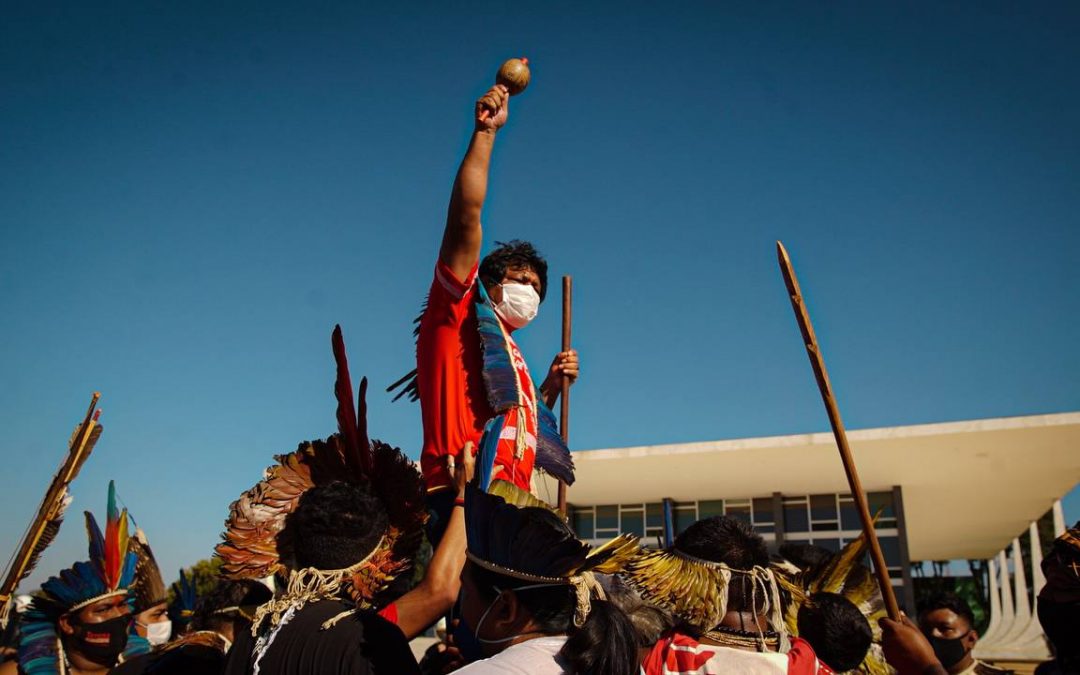
30/Jun/2021
A case that could seal the future of indigenous peoples returns to the Supreme Court’s voting agenda in August, when the international recognition of indigenous peoples is celebrated
Brasília, June 30, 2021 – Brazil’s Federal Supreme Court (STF)’s ended its session today without ruling the case on the demarcation of indigenous lands. The Chief Justice, Luiz Fux, stated that the case will return to the Court’s agenda in August 25th, after the July recess (from 2 to 31).
Camped for weeks in Brasília and in other territories across the country, the indigenous people expected the Court to analyze the repossession lawsuit filed by the government of Santa Catarina against the Xokleng people, concerning the Ibirama-Laklãnõ Indigenous Territory, where the Guarani and Kaingang peoples also live. With the status of “general repercussion,” the ruling will serve as a guideline for the federal government and all instances of Justice, as well as a reference to all proceedings, administrative procedures and legislative bills in regard to demarcation procedures.
“Sadly, the general repercussion was not ruled, but we will keep up our fight, as always, for the demarcation of our lands and in defense of the environment. The Supreme Court has pledged to schedule the trial for August, and we will continue our mobilization. The shows disregard to indigenous rights, and we do not have it,” warns Brasílio Priprá, leader of the Xokleng people.
The postponement of the decision reinforces the urgency of the struggle waged by the indigenous peoples. “We have to keep resisting. We must keep up our fight with the same energy. August has to be the month of our struggle!,” said Kretã Kaingang, executive coordinator of the Association of Indigenous Peoples of Brazil (Apib) and one of the organizers of the Rise for Earth Camp, which has gathered more than 850 indigenous people from 50 nations in the Brazil’s capital since June 8.
The month of August is marked by the international recognition of indigenous peoples and, according to Sonia Guajajara, Apib’s executive coordinator, the fight for rights continues across the country, until the new date of the trial. “We are here today once again call all for the ‘Indigenous August’. We will return to Brasília in August to fight against all these setbacks, against all these anti-indigenous measures that are being processed within the three levels of Government.”
Marco Temporal
The Time Limit Trick, know as Marco Temporal in Portuguese, is a pseudo-legal interpretative framework developed by political sectors – such as the agribusiness lobby – which seek to limit Indigenous land rights in order to enable the economic exploitation of Indigenous territories. In blatant opposition to the constitutional norms which enshrine Indigenous territorial rights, the “Temporal Mark” framework postulates that Indigenous peoples are only entitled to the lands they occupied on the date of the promulgation of the Brazilian Federal Constitution – i.e. October 5th, 1988. Alternatively, if they were not physically on the lands, they would need to have been part of a legal dispute or in a material conflict proven by the area on that same date.
In addition to contradicting the Brazilian Constitutional framework – which does not establish any temporal limitations to Indigenous land rights – this hypothesis is unfair, as it disregards expulsions, forced removals and all the violence Indigenous peoples have endured before the Brazilian Constitution was enacted. Furthermore, it ignores the fact that, until 1988, Indigenous groups were under the tutorship of federal government, and lacked the autonomy to file lawsuits in their own name.
The adoption of the as a criterion for a time limit trick demarcation of indigenous lands is also one of the points provided for by Bill 490, a bill that was strongly opposed by the indigenous peoples over the past weeks.
Approved by the Commission of Constitution and Justice (CCJ) of the Chamber of Deputies, Bill 490, which incorporates a series of other attacks on indigenous constitutional rights, can be put on the agenda at any time.
“We didn’t lose heart when the voting was postponed, nor when Bill 490 was approved by the Commission. This is not the first time our rights have been put at risk. We are resistance and we will keep on fighting. Despite all these attacks, we’re chanting and fighting, and that’s how we’re going to win,” guarantees Juma Xipaya, a leader of Middle Xingu, in Pará.
Postponements
The trial was previously scheduled for June 11, but was suspended after Minister Alexandre de Moraes requested the matter to be discussed in a separate, more detailed plenary session only one minute after the trial began. The other ministers didn’t even cast their votes. Nonetheless, the vote of the rapporteur, Minister Edson Fachin, was made public.
The chief justice, Luiz Fux, put the case back on the agenda this Wednesday (30), and is expected to be resumed in August 25th, according to Fux.
Even with no date set for the trial, the indigenous peoples say they will remain mobilized. “We have to continue our resistance. We must keep up our fight with the same energy. August has to be the month of our fight!,” says Kretã Kaingang.
“They (the Supreme Court Justices) have no idea of the suffering of those who live under a tarpaulin on the side of the road, within a land being reclaimed, suffering threats, suffering repossession, with their leaders treated as criminals. The Justices have no idea what it feels like,” emphasized Kretã.
The Ibirama-Laklãnõ Indigenous Land is located between the municipalities of Doutor Pedrinho, Itaiópolis, Vitor Meireles and José Boiteux, 236 km northwest of Florianópolis (SC). The area has a long history of demarcations and disputes, crossing the 20th century, during which it was drastically reduced. It was identified through studies by the National Indian Foundation (FUNAI) in 2001, and declared by the Ministry of Justice as belonging to the Xokleng people in 2003. They have never stopped claiming the right to their ancestral territory.
In the general repercussion proceeding, the Justices will also analyze the ruling of Justice Edson Fachin, of May 2020, which suspends the effects of Opinion 001/2017 of the Attorney General’s Office (AGU). The ruling made official the so-called “temporal framework,” among other issues, which has been used by the federal government in attempts to paralyze and even reverse demarcations.
In that same ruling, Minister Fachin suspended, until the end of the Covid-19 pandemic, all legal proceedings that could result in evictions or in the annulment of demarcation procedures. This decision must also be discussed by the Court.
Learn more on the case that could seal the future of indigenous peoples here
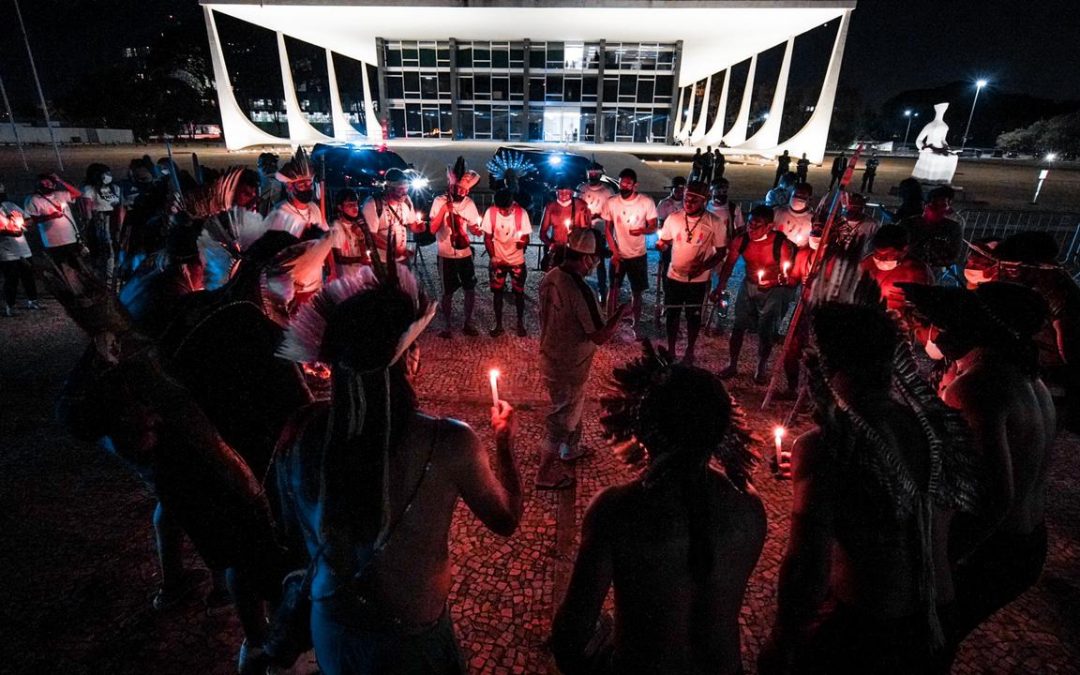
29/Jun/2021
The Supreme Court will consolidate its legal interpretation on the rights of indigenous peoples over their lands. The Time Limit Trick is a pseudo-legal interpretative framework developed by political sectors to limit Indigenous land rights in order to enable the economic exploitation of Indigenous territories.
Brasília Brazil, June 29, 2021 – Tomorrow, June 30, 2021, Brazil’s Supreme Court (STF) begins the trial that will define the future of the Indigenous Land demarcations in Brazil.
The Court will analyze the land repossession lawsuit filed by the state government of Santa Catarina against the Xokleng people, concerning the Ibirama-Laklãnõ Indigenous Land, where the Guarani and Kaingang peoples also live. In 2019, the Supreme Court applied the status of “general repercussion” to the suit, which means that the decision will serve as a guideline for the Brazilian federal government and all instances of Justice regarding demarcation procedures.
The ministers will also analyze the ruling of Minister Edson Fachin, of May 2020, which suspends the effects of Opinion 001/2017 of the Attorney General’s Office (AGU). The Opinion institutionalizes the so-called “Marco Temporal (Time Limit Trick),” among other issues, and has been used by the federal government to paralyze and even reverse the demarcation of Indigenous lands. In that same ruling, Minister Fachin suspended, until the end of the Covid-19 pandemic, all legal proceedings that could result in evictions of Indigenous groups in repossession suits or in the annulment of demarcation procedures. This decision must also be discussed by the court.
The Time Limit Trick is a pseudo-legal interpretative framework developed by political sectors – such as the agribusiness lobby – which seek to limit Indigenous land rights in order to enable the economic exploitation of Indigenous territories. In blatant opposition to the constitutional norms which enshrine Indigenous territorial rights, the “Temporal Mark” framework postulates that Indigenous peoples are only entitled to the lands they occupied on the date of the promulgation of the Brazilian Federal Constitution – i.e. October 5th, 1988.Alternatively, if they were not physically on the lands, they would need to have been part of a legal dispute or in a material conflict proven by the area on that same date.
In addition to contradicting the Brazilian Constitutional framework – which does not establish any temporal limitations to Indigenous land rights – this hypothesis is unfair, as it disregards expulsions, forced removals and all the violence Indigenous peoples have endured before the Brazilian Constitution was enacted. Furthermore, it ignores the fact that, until 1988, Indigenous groups were under the tutorship of federal government, and lacked the autonomy to file lawsuits in their own name.
The trial was previously scheduled for June 11, but was suspended after Minister Alexandre de Moraes requested the matter to be discussed in a separate, more detailed plenary session only one minute after the trial began. The other ministers didn’t even cast their votes. Nonetheless, the vote of the rapporteur, Minister Edson Fachin, was made public.
The trial will be broadcast on TV Justiça, with the presentation and debate on the votes. The trial is not expected to be concluded on that date or even in the special session, already scheduled for the following day,July 1, because ministers can ask to analyze the matter more carefully, taking it under advisement, suspending and postponing the session for an uncertain date.
The Ibirama-Laklãnõ Indigenous Land is located between the municipalities of Doutor Pedrinho, Itaiópolis, Vitor Meireles and José Boiteux, 236 km northwest of Florianópolis (SC). The area has a long history of demarcations and disputes, crossing the 20th century, during which it was drastically reduced. It was identified through studies by the National Indian Foundation (FUNAI) in 2001, and declared by the Ministry of Justice as belonging to the Xokleng people in 2003. They have never stopped claiming the right to their ancestral territory.
What do the participants in the proceeding say?
“The delay in demarcating indigenous lands is very troubling. Because, as time goes by, difficulties for the demarcation of land in Brazil increase. Indigenous peoples need to have their traditional rights acknowledged. And we would like the general repercussion to be ruled in our favor, and that we stop talking about a Time Limit Trick.”
Brasílio Priprá, one of the leaders of the Xokleng
“We expect the Supreme Court adopt a fairer, more reasonable interpretation that can help to enforce our rights. And that it no longer resorts, for example, to the temporal framework principle to limit the recognition of rights to us, indigenous peoples, which has been happening for the last ten years. But the Court can also strengthen our struggle in this confrontation with other powers, which use the Time Limit Trick as a criterion for the restriction of rights.”
Samara Pataxó, attorney for the Association of Indigenous Peoples of Brazil (APIB)
“The way the people lost their territory was the most violent, vilest, the most terrible. At the beginning of the last century, there was demarcation without technical criteria. In the 1920s, a significant part of the territory was lost. In 1950, the same thing happened. Afterwards, the construction of a dam took away the best lands. And in this context, the dispute of the Xokleng people takes place, so that the return of these stolen areas is in fact secured.”
Rafael Modesto, attorney for the Xokleng community and legal advisor to the Indigenous Missionary Council (CIMI).
Rise for the Earth
Indigenous peoples from all regions of the country have mobilized against the Time Limit Trick principle. Since June 8, around 850 leaders from 50 peoples have been mobilized at the Rise for the Earth camp, in Brasília, against the advance of the anti-indigenous agenda by the Bolsonaro government and the rural bench in Congress.
“The camp is a call from the land to all peoples in Brazil, for us to show this genocidal who the true owners of the land are. We are in Brasília to guarantee our original rights and to say ‘stop genocidal Bolsonaro and his Machiavellian projects against the indigenous populations’,” says Kretã Kaingang, APIB’s coordinator.
Indigenous peoples in all territories have been mobilizing for weeks against the “evil package” that is being processed in the National Congress, such as Bill 490/2007, which opens indigenous lands to predatory economic exploitation and makes it impossible, in practice, that new demarcations be made. In the highway obstructions, rituals and prayers, the indigenous peoples also take a stand against the temporal framework principle, which seeks to restrict their constitutional rights.










